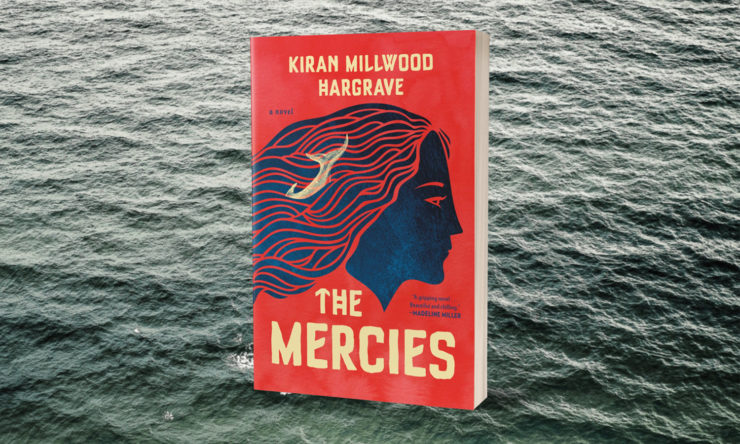On Christmas Eve 1617, in the tiny fishing village of Vardo, Finnmark, a sudden storm wipes out almost the entire male population. Forty of the grown men who had set out in their boats, much as they often did, are killed by a freak storm that defies logic, and the women of Vardo are left to fend for themselves, even as they grieve for the loss of their loved ones.
In Kiran Millwood Hargrave’s first adult novel, The Mercies, the “storm comes like a finger snap […] then the sea rises up and the sky swings down and greenish lightning slings itself across everything, flashing the black into an instantaneous, terrible brightness,” as the women are perhaps “screaming but here is no sound save the sea and the sky and all the boat lights swallowed and the boats flashing and the boats spinning, the boats flying, turning, gone.”
For three years the women live on their own, many still deeply grieving over the loss of their husbands, sons, brothers, and lovers, but many others are managing the work that was traditionally done in the past by these men. The women now head out to sea to fish, herd the reindeer, and plant whatever little can be grown during the summer months; they are self sufficient, even as they may remain emotionally wrecked. The local pastor does not believe their new roles are proper, but can not tell them to simply give up what it takes to survive in that landscape. Instead, he encourages them to stay with the Lutheran ways and not be swayed by what he considers to be the pagan beliefs of the Sami people, who are indigenous to the tribal north, but the people of Vardo have always been open to help from the Sami—some runes for protection, charms to help the fishing haul, or for a favourable wind to set sail at. Most of the women see no harm in using the ancient religious ways to help their grief and their new life, and never have. One of the young men of the village had even married a Sami girl, and though there is some mistrust towards her among the more pious women of the village, as a whole there seems to be no great divide between the tiny population, the pastor, or the tribal north.
That is, until word of a village full of self-sufficient women reaches the men who rule the land. A village full of women who fish, who hunt, who herd, plant, harvest, live as if they have no need for men at all? It is shocking. One woman is even seen wearing trousers—surely a mark of the devil? And so a Commissioner is dispatched to Vardo, a Scotsman by the name of Absalom Cornet, who is experienced in the matters of rooting out witches, and the evil that lurks in the hearts of women gone wild in this way. Along his travels to Vardo, he picks himself up a young Norwegian wife, the daughter of a ship owner who has had some bad investments of late and can no longer afford to take care of his daughters in the fashion they were accustomed to. Ursa is quite literally shipped off with her husband to Vardo, with nothing but the most basic information. She knows nothing about her husband beyond that he is commissioned to be in Vardo, and she knows nothing of Vardo beyond that her husband is to be Commissioner there and that she is to accompany him. She does not get to know him any better en route to Vardo, and simply submits to his desires and his lack of interest in her beyond her traditional “duties” as his wife.
When they reach Vardo, Ursa is shocked to see how little she has to manage with and how brutal it all is. They are given a very humble home, as well as reindeer carcasses for food, and otherwise left to their own devices. Absalom trudges off daily to find out what exactly his commission will involve; Ursa is left behind. Lonely, cold and miserable, she does not know how to do what is expected of her—keeping house, making bread, washing clothes—let alone how to cut a reindeer carcass down into edible portions. She’s entirely lost, but somehow drawn to one young local woman, Maren, whom she hires to help her learn how to manage her home.
Three years ago, Maren lost her father, her brother, and the young man she was to marry to the storm; since then has lived with her depressed mother and her increasingly reticent and withdrawn Sami sister in law, whose toddler was born after the death of his father. In their home, Maren is the only one who has attempted in some way to move on, though she is constantly plagued by nightmares. She joins some of the other Vardo women in their fishing expeditions, as they are led by Kirsten, one of the more outspoken women who has also taken responsibility for the village’s reindeer herd. Maren and Kirsten both befriend Ursa, and help her socialise with the Vardo women, though even as some of the women start to trust Ursa, many others are uncertain of her because of her status as the Commissioner’s wife.
Buy the Book


The Mercies
The Commissioner himself is a godly man, as we are often told. His interest seems to lie entirely in rooting out what he considers to be witchcraft amongst the village women. So begins a frightening witch hunt, one that Hargrave has taken from historical fact. There were indeed many women (and some Indigenous men) tried for witchcraft during this time in Norway’s history, and Hargrave’s version of this incredibly misogynistic, violent piece of history is a very well written, contained and evocative story about how independent women can (and do) threaten men in power, and how easily ancient cultures can be painted to be a threat to society and organised religion (the Church, in this case). While Absalom is busy investigating absurd accusations against some of the women in Vardo, Ursa and Maren are growing closer every day. Maren feels for Ursa something she can not name and is uncertain how to act on. That she feels it, though, can not be denied.
How does same sex desire play out between two young people who have no way to express what they are feeling, when there is no vocabulary for this, no other narrative for them than the conservative one they have been born into—the narrative that tells them that what they feel is wrong, that their only role is to be married to a man, agreeable to a man, in total submission to a man? In this extreme climate, where everything is cold and hard and unforgiving—the landscape, the society, the rules, the life—anything that may generate softness, heat, or joy feels like a crime.
The Mercies is a beautifully written, disturbing and stressful read. The sheer powerlessness of women in the face of abusive male authority is frightening, especially when we see how they have picked up their lives post-men and carried on, filling in all the traditionally male roles left behind, making sure none of them starves or freezes. We see them pull the men’s bodies from the freezing sea, store the bodies until the earth can be dug into, bury their men, and choose to carry on living as best they can. And yet, with the arrival of one man who has been given power over them, they are no longer able to live as they were. Of course, regardless of this story being actual historical fact, it is easy to draw modern day parallels, which just makes the sparse, taut narrative so much more suffocating.
The Mercies is available from Little, Brown and Company.
Mahvesh loves dystopian fiction and appropriately lives in Karachi, Pakistan. She writes about stories and interviews writers for the Tor.com podcast Midnight in Karachi when not wasting much too much time on Twitter.










